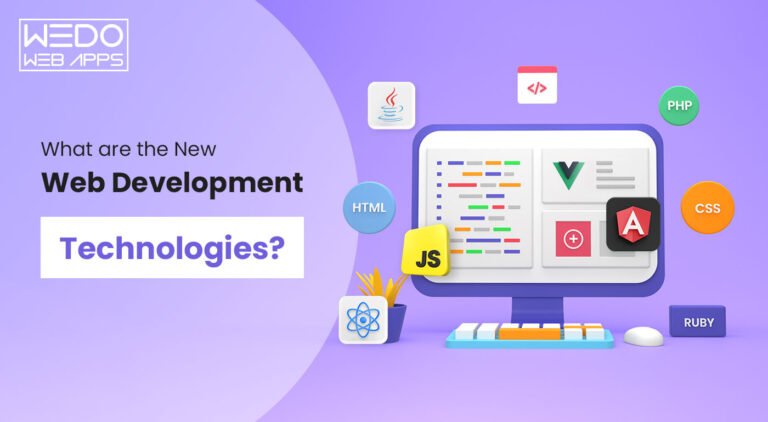10 Jan, 2023 | web development agency
What are the new web development technologies?

Why Do Web Development Technologies Matter?
-
It Facilitates Easy Debugging
-
Better Security Features
-
Growth of Locationless Organization
-
Explosion of Omni Device Application
What Are Modern Web Technologies That Are Trending Right Now?
#1. Low Code/No-Code Development
Amongst some of the most in-demand web development technologies scores high, the need for low code software. Removing the need for enlisting huge coding technologies to create web materials, now comes the newness of using no code or low code in software development. Using low code by web development agencies speeds up the digital process in software applications. It requires no experience or technical skill set and can be done with visual interfaces with clear and straightforward rationale.#2. Motion UI For User Experience
Online users direct their focus towards attractive and intuitive web designs. Such is the role of motion UI that garners attention and plays a significant role in adding immense value to the entire digital marketing and business module. The reasons why motion UI is becoming so popular include:- Minimized development duration
- Attracts users on an extensive scale
- Helps in enterprise cost-saving
- Attractive and intuitive looking
#3. API first approach
Integrating functionality has become easy for enterprises with building applications that follow an API-first approach. In a world where everything is getting connected (including enterprises), API-first apps have become significant in improving business performance. The reason for API-first approach is trending includes:- Front-end developers no longer need to rely on backend developers
- The development cycle has become faster
- Increased integrations and capabilities
#4. Voice Search Optimization
The one trend that has been significantly impacting users is voice search optimisation. It results in a considerable difference where more consumers are driven towards voice search. The king of convenience this technology provides the users itself is evidence of the growth surge. A few reasons for the technology’s popularity include the following:- Enabling users to find what they are looking for without touching or typing on web interfaces
- Effective and seamless
- Faster results and easy accessibility to data
- Results in better engagement and sales
#5. Serverless architecture
The serverless architecture enables building applications without having to look into the infrastructure. The apps run on an AWS server that is up in the cloud. You needn’t scale or maintain servers to run applications, databases and storage systems. Reasons, why serverless architecture has grown in popularity, include:- Developers being able to focus on core product
- Enable great product development
- Scalability and reliability
#6. Advanced IoT
The IoT, or the Internet of Things has been the greatest revolution in the web application development industry and can’t be taken lightly! From helping connect data from machines to humans, then humans to humans, to any random thing to humans, it has enabled web applications to meet the strong needs of consumers. Reasons why IoT has become so popular include:- Easier and faster to load
- Helps creation of reliable and scalable applications
- Trendy and efficient UI
#7 Progressive web applications
A progressive web application isn’t a completely new concept, however, enterprises have been implementing PWAs at a tremendous rate. Their ability to deliver native-like performance and user-friendly approach keeps them in trend. Reasons why PWAs have become popular include:- Seamless and fast
- Installing and updating is easy
- Delivers native-like user experience
- Lesser load time
- More conversions
#8. Artificial Intelligence
In simple words, Artificial Intelligence (AI) manifests human intelligence in machinery. Computer systems now can enrich their mode of functioning by relocating the complex procedure by the human brain. This not only eases the part of human workload, but also adds more colour and opportunity for huge growth in the future. AI is the need of the hour. It is now implemented on huge scales to boost its applicability in the work field. It is highly efficient and subject to constant improvement. Therefore, the demands remain unending. AI vendors and scientists are looking for better evolution prospects and ease the way of life for others. AI can now detect fraud, language processing, predictive analysis, derive valuable insights, customer-related insights, and many more.#9. Blockchain Technology
Blockchain is a community-based or shared public ledger based on a digital network. It promotes transactional activities and tracks the movement of assets within a business network. Currently, Blockchain is one of the most sought web development services. It has led to a substantial digital transformation in many areas. Blockchain has been the new field of interest for many businesses that aspire to grow in the future with adaptive and responsive Technological well-built. A place where Blockchain adaptation in the business network has seen a substantial positive acceptance is in the banking sector. This is because the payment done in banking through the Blockchain inculcation is highly beneficial. It provides quick and efficient transaction options, transactions protected with high-level securities, and exchange of money through cross borders. Conclusion While there are many more new additions to web development technology, these were a few that have been considered phenomenal. Which ones impress you? Would you like to try them for your business or personal needs? Study and channel them properly and see what excites you to try for yourself. Also, consider featuring those which shall help your business grow and reach wider. Looking to upgrade your tech stack? Hire a top-notch web development agency today. FAQs 1) What Is The Latest Technology For Web Development? There are many innovations in the field of web development. Some popular ones include Angular, designed for dynamic web application development. Ruby on Rails is a server-side web technology making development easier and faster, and Yii, an open-source framework built on PHP5.- What Is The Newest Technology Right Now?
- What Are The Latest Web Development Programming Languages?
Frequently Asked Questions
In the UK, some of the front-end technologies that are gaining popularity include React, Vue, Angular, and Ember. React, a JavaScript library created by Facebook, is widely used for developing web and mobile applications owing to its flexibility, reusability, and scalability. Vue, another JavaScript framework, is preferred by developers because of its ease of use, high performance, and customizable nature. Angular, a TypeScript-based framework, is widely used for building complex applications, while Ember, an open-source JavaScript framework for web development, offers a convention over configuration approach that makes it easy to create large-scale web applications. Overall, these technologies are becoming more popular due to their ability to simplify development and deliver a better user experience.
One of the biggest benefits of using a headless CMS for web development is the flexibility it offers. With a headless CMS, content can be separated from the presentation layer (i.e., the website or app interface), allowing for easier customization and faster updates. This means that developers can choose and integrate the most suitable tools and technologies for different parts of the project without being limited by the CMS platform itself. This approach also allows for more streamlined content management, as content can be easily repurposed across different channels and formats, such as websites, mobile apps, smart speakers, and more. Additionally, a headless CMS can improve site performance and scalability, as it reduces the amount of unnecessary code that needs to be loaded, resulting in faster page load times and better user experience.
The use of AI has greatly impacted web development in the United Kingdom. AI-powered tools like chatbots, voice recognition, and recommendation engines are being used to enhance user experience by providing personalized content, recommendations, and assistance. Furthermore, AI-based algorithms are being used to analyze user behavior, optimize website layouts, and improve search rankings. Technology companies in the UK are investing heavily in AI research and development, with a focus on creating more intelligent and efficient web development solutions. As a result, the future of web development in the UK looks bright, with new and innovative AI-powered techniques being harnessed to create cutting-edge websites and applications.
Progressive web apps (PWAs) are becoming an increasingly important part of modern web development in the UK. PWAs offer a number of benefits over traditional apps, including faster load times, better engagement rates, and the ability to work offline. They also provide a more seamless user experience, as they can be accessed directly from a user's home screen without the need to download, install and update an app. PWAs are particularly useful for businesses that rely heavily on mobile traffic, as they can help to improve the user experience and boost engagement. They also have the potential to drive new revenue streams, as they can be monetised through in-app purchases, subscriptions, and other methods. Overall, PWAs are an important tool for web developers in the UK, and are likely to become increasingly popular in the years ahead. As mobile traffic continues to grow, businesses will need to find new ways to connect with users and drive engagement, and PWAs offer a powerful new tool to help them achieve these goals.
Virtual reality (VR) has a significant impact on web development in the United Kingdom. Web developers are incorporating VR into their web designs to create an interactive and immersive experience for users. Users can explore spaces, view products, and interact with various elements in the virtual environment. The use of VR in web development in the United Kingdom has also led to more complex designs and increased demand for high-quality graphics and animations. Additionally, VR technology allows for more personalized experiences, as developers can use user data to create custom VR experiences. Overall, VR is transforming the way web developers approach design and user experience in the UK.

